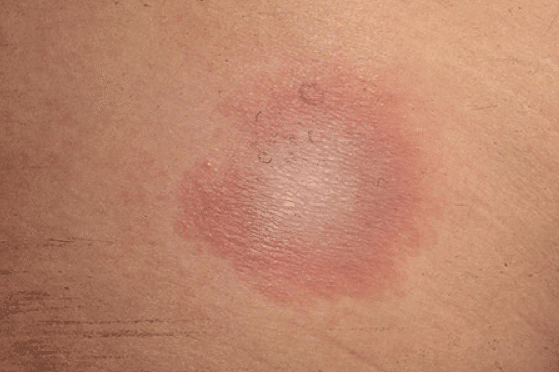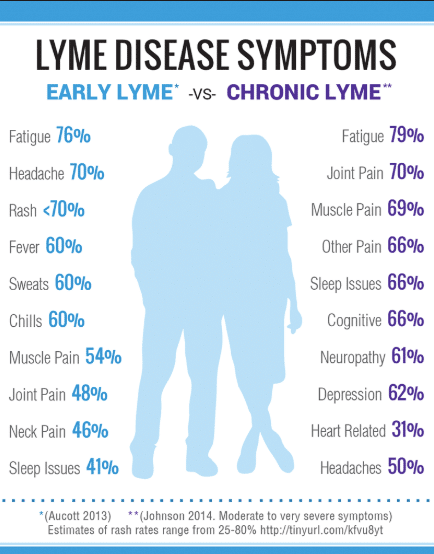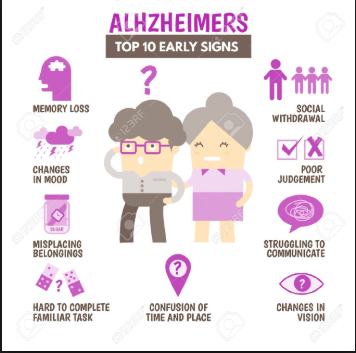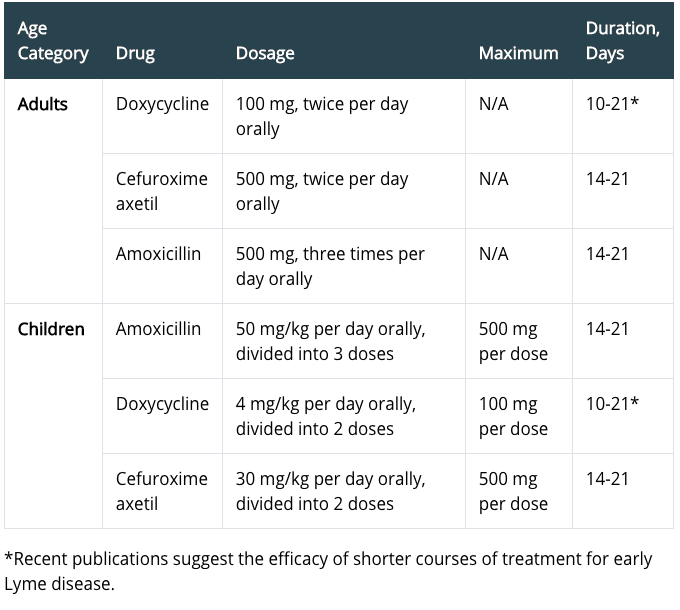Lyme disease can be very painful and chronic. Often a Doctor won’t be able to diagnose it right away based on the initial symptoms. In elderly adults Doctors can easily mistake Lymes Disease symptoms for other chronic diseases such as Alzheimer’s or Neuropathy. Your own experience can be a great help in determining what you might have.
If you’re having trouble figuring out what chronic condition you might have, you’re not alone. Even movie stars like Kris Kristofferson are the subjects of medical mistakes. If you don’t think your doctor has your diagnosis correct, seek a second opinion.

Take charge of your treatment!
What is Lyme Disease?
Lyme Disease, first found in the town of (you guessed it) Lyme, Connecticut, is a chronic condition caused by one or a combination of four types of bacteria:
- Borrelia burgdorferi
- Borrelia mayonii
- Borrelia afzelii
- Borrelia garinii
The first two bacteria are found in the United States. The last two are most common in Europe and Asia. Infected Black-legged ticks, otherwise known as deer ticks are the most common carriers of the bacteria. When the tick bites you, the bacteria enters your body. Ticks bite lots of people without giving them Lyme Disease. According to the Mayo Clinic, the tick generally has to be on you for about 36-48 hours to transmit the disease. Some of these ticks. You might not see them on your body.
Where You Can Contract Lyme Disease
Naturally Lyme disease is most common in areas with lots of ticks. In the United States these areas are the Northeast States down the Atlantic seaboard, and the upper Midwest. The Centers for Disease Control (CDC) monitors cases of Lyme Disease and have maps showing disease locations throughout the United States. The map below shows cases in 2017.

Remember with this map that people didn’t necessarily contract Lyme Disease in the place where it showed up. Many people may have travelled from our state (Arizona) to New England on vacation. The tick may have bit them during their trip and they brought it home.
Lymes Disease Symptoms that Start Right Away
Many doctors familiar with Lyme Disease would highly recommend treating the Lymes Disease symptoms as soon as possible. This would be great, IF people knew they had the disease right away. When ticks bite you, they inject a little local anesthetic. Very often you won’t feel the bite. Then the tick falls off and you don’t know it ever happened. If you think a tick bit you, try to see a doctor right away.
Some people develop a ‘bullseye rash’ around the tick bite. The rash would be a very good indication that you should go to the doctor. According to the CDC, 70-80% of people develop the rash between 3 and 30 days after the tick bite.

Other early Lymes Disease symptoms include:
- Rash
- Fever
- Facial paralysis or drooping
- Chills
- Fatigue
- Muscle and joint pain
- Lymph node swelling
- General body aching
- Headaches
- Stiff neck
- Trouble sleeping
- Irregular heartbeat
- Eye inflammation
If you don’t have the rash or other symptoms, the bacteria may circulate in your body for years. Then for whatever reasons, lymes disease symptoms develop.

Chronic Lymes Disease Symptoms
If the disease does not show symptoms for a while, you may experience many different symptoms. You may still see many of the short-term Lymes Disease symptoms. These are in addition to the first set:
- Sore throat
- Sore feet, mostly in the morning
- Back pain (not caused from something else)
- Face twitching or other muscles
- Confusion, or difficulty thinking about something
- Hard to concentrate
- Reading is difficult
- New information confuses you
- Forgetfulness
- Poor short-term memory
- Disorientation – not sure where you are
- Short-term memory loss
- Speech errors
- Mood swings
- Depression
- Anxiety
- Hallucinations
- Delusions
- Paranoia
- Trouble sleeping
- Light sensitivity
- Blurry vision
- Lightheadedness
- Motion sickness
- Insomnia
- Night sweats
- Irritable bladder
- Breathlessness
- Napping during the day
- Disabilities
- Constipation
- Diarrhea
- Changes in weight (up or down) for no other reason
- Hair loss for no other reason
- Unexplained milk production or breast pain in women
- Disappearance and recurrence of symptoms on a regular basis
Parallels to Alzheimer’s
As you can see, it would be easy to diagnose many of these symptoms (confusion, disorientation, hard to concentrate, short-term memory loss etc.) as Alzheimer’s symptoms. If you compare the symptoms above to this infographic of Alzheimer’s symptoms, you can see a lot of overlap:

You can also learn more about how Alzheimer’s manifests itself and the typical symptoms from this post from the wife of one of our residents. Her husband started showing signs of Alzheimer’s in 2002, and we made this video in 2018.
Some of these symptoms such as insomnia, fatigue and napping during the day could be confused with Sundowner’s Syndrome. Sundowner’s is a condition associated with Alzheimer’s disease.
What to Do About Lymes Disease Symptoms
Your best shot at fighting Lyme Disease is if you catch it early. Many doctors have had success treating Lymes Disease symptoms with antibiotics such as doxycycline, amoxicillin, cefuroxime axetil. Of course doctors will prescribe different amounts of these antibiotics depending on the health and age of the patient. Here are some general guidelines published by the CDC:

Notice that many of the treatments only last 2-3 weeks. Long-term antibiotic used to treat Lymes Disease symptoms may lead to many other complications. Once the condition becomes chronic, antibiotics may not be all that effective.
Long-Term Treatment of Lyme Disease
You have the misfortune of having Lyme Disease for a longer period, the antibiotics just don’t work, or the symptoms don’t develop. In that case there is not a lot that modern medicine seems to be able to do to help.
Generally, the doctors will tell you the disease will subside over time. How long that time lasts varies from several months to many years.
Ugh!
While waiting for it to subside, your doctor will probably prescribe some pain killers or anti-inflammatory drugs to manage the symptoms. They might also give you some steroids that help reduce some swelling.
Natural Methods to Reduce or Eliminate Lymes Disease Symptoms
Lyme Disease has a much better shot of being fixed than Alzheimer’s. There are doctors who are finding some natural methods of treating Lyme Disease. Two of those doctors are Stephen Harrod Buhner and Bill Rawls.
Healthy Lifestyles
As with all natural healing methods, both doctors recommend a very healthy diet. Eating lots of fruits and vegetables and avoiding processed foods and sugars are important. Ridding your body of toxins and filling it up with nutrients allows your immune system to function at its optimum level.
Plant-Based Oils
Another recommendation the two doctors provide is the use of plant-based oils. The oils serve 3 purposes:
- Fighting the bacteria
- Improving your immune system
- Detoxify your body
Four of these essential oils are very effective in promoting antimicrobial activity:

- Cinnamon Oil – Some studies have shown that cinnamon oil has been able to fight microbes within 14 days of application
- Thyme Oil – Thyme is very good at fighting bacteria in Salmonella and spoiled milk.
- Oregano Oil – Oregano silver and colloidal silver work very well against certain strains of antibiotic-resistant bacteria. That means they can control infections well.
- Tea Tree Oil – Very effective in fighting bacteria and fungus, such as toenail fungus. Other studies have shown it is effective in fighting E. Coli and Staph infections as well. This is especially true when combined with Eucalyptus. The oil is slow-releasing, meaning it will continue to provide benefits for a while after application.
Although it may be difficult to sleep due to the Lymes Disease symptoms, you should still try your best. All of the Alzheimer’s type symptoms are caused by the bacteria moving up into your brain. During sleep the brain recharges and drains glymphatic fluid.
Sleeping effectively helps drain the brain of many toxins, and may reduce the bacteria causing the Lyme Disease. Losing sleep will also impair your immune system. That will make it harder to fight the disease.
Lymes Disease Symptoms or Alzheimer’s or Neuropathy?
Sometimes it’s difficult to know exactly what you have. You are the person who should ultimately be in charge of your health. If you don’t feel comfortable about what a doctor tells you, find another doctor. If it is a pretty scary diagnosis such as Alzheimer’s or Cancer, by all means obtain a second opinion. Doctors are people too. We all make mistakes.
One thing is for sure. Leading a healthy lifestyle with a good diet and exercise will only help or lessen any chronic condition. We work with a Naturopathic doctor and a physical trainer at our assisted living homes. Having that expertise, along with our licensed caregivers, provide our residents the best chance of easing any chronic conditions they may have.
Very interesting read, Thank you for sharing all this helpful information
ReplyDelete